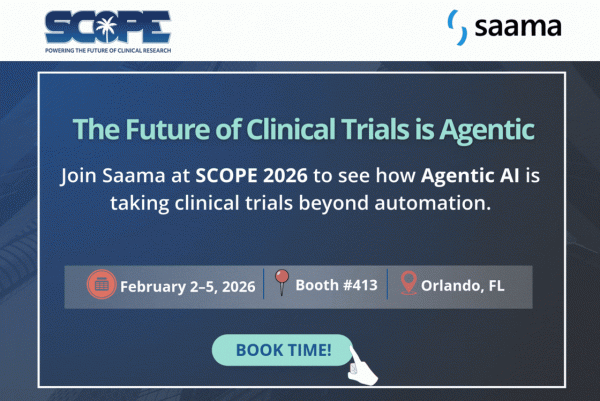Clinical data teams know this challenge all too well- creating SDTM (Study Data Tabulation Model) specifications and programming deliverables can take upwards of 8 hours per domain. Manual mapping is slow, repetitive, and prone to human error. But what if AI could automate 75% of that work without sacrificing accuracy?
Saama’s recent webinar demonstrated exactly how this is possible. The session showcased our SDTM Navigator module within its Biometrics Research and Analysis Information Network platform. Below’s a recap of what was covered and why it matters to biometrics teams.
SDTM Acceleration, Powered by Agentic AI
Part of Biometrics Research and Analysis Information Network, Saama’s SDTM Navigator uses an Agentic AI framework to convert raw clinical data into production-ready SDTM specs and programs in minutes. The system is designed to deliver both speed and explainability, removing bottlenecks while ensuring traceability.
Core capabilities include:
- SDTM and ADaM transformation modules
- Agentic GenAI for specification and mapping generation
- Interactive TLF specification creation
- Digitized metadata library management
- CDISC compliance support
Additional platform features such as role-based access control, audit trails, versioning, and compute activity scheduling support enterprise-grade deployment.
Performance Outcomes
In pilot use cases, SDTM Navigator has demonstrated:
- 75% of mappings automatically generated by the initial agent
- Approximately 70% accuracy in those mappings
- 50-70% reduction in time required for spec and code creation for studies with 20+ domains
The most significant gains are realized in initial spec creation and programming: areas that are often repetitive and time-consuming. The human review and approval processes remain essential and are fully supported within the platform.
Flexible Deployment Options
SDTM Navigator is designed to support multiple operational models:
- End-to-end SDTM spec and code lifecycle management within Biometrics Research and Analysis Information Network
- Downloadable outputs for use in sponsor environments (e.g., SAS Clinical Execution Environment or SCE)
- Integration with sponsor-specific standards, macros, and global libraries
- Optional hosting within the sponsor’s secure compute environment
The platform supports standard file formats- CSV, Excel, and SAS, and can be configured to integrate with validation tools such as Pinnacle 21 (both community and enterprise versions). Define.xml generation and submission-ready artifacts are supported in the Pro and Enterprise editions of the Navigator.
Roadmap and Broader Capabilities
The SDTM Navigator is part of Saama’s broader Navigator series, which includes upcoming modules for:
- Navigator Pro: Adds define.xml, annotated CRFs (aCRFs), CSDRG, and full eCRT package generation.
- ADaM Navigator and TLF Navigator: Designed to support ADaM dataset creation and statistical output generation, respectively.
These tools are built around the same Agentic GenAI framework, which combines predictive intelligence, deterministic logic, and human-in-the-loop feedback to improve programming productivity across the clinical lifecycle.
Experience It for Yourself
If you’re interested in exploring SDTM Navigator, Saama offers personalized demo sessions and workshops. We encourage sponsors to bring de-identified or dummy datasets, which we can preload into the platform for a hands-on demonstration. Within 24- 48 hours, you’ll be able to review automatically generated specs and programs tailored to your data, demonstrating just how far automation has come.
Up next: AI-powered ADaM autogeneration. Join us on July 29 at 11 AM ET to see how GenAI can reduce ADaM programming time by up to 70%. Register now for the live webinar with Saama’s AI experts.

